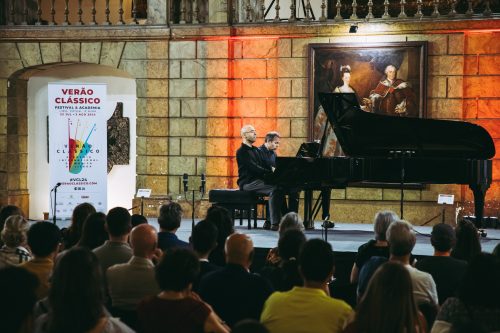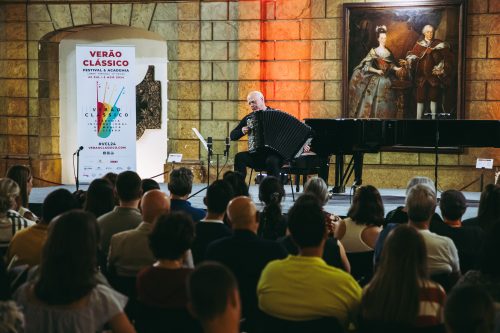 Portugal Verão Clássico Competition 2024 [2] – MasterFest Live performance II: Stephan Picard, Eszter Haffner (violins), Miguel da Silva (viola), Patrick Demenga (cello), Janne Saksala (double bass), Geir Draugsvoll (accordion), Eldar Nebolsin, Filipe Pinto-Ribeiro (piano). Museu Nacional dos Coches, Lisbon, 27.7.2024. (LV)
Portugal Verão Clássico Competition 2024 [2] – MasterFest Live performance II: Stephan Picard, Eszter Haffner (violins), Miguel da Silva (viola), Patrick Demenga (cello), Janne Saksala (double bass), Geir Draugsvoll (accordion), Eldar Nebolsin, Filipe Pinto-Ribeiro (piano). Museu Nacional dos Coches, Lisbon, 27.7.2024. (LV)

Bach – ‘Allein Gott in der Höh sei Her’, BWV 711; ‘Actus Tragicus’ (‘Gottes Zeit ist die allerbeste Zeit’), BWV 106 (transcriptions by György Kurtág)
Schubert – Fantasie in F minor, D 940 (for piano 4 palms)
Sofia Gubaidulina – ‘De Profundis’
Dvořák – Quintet No.2 in G main, Op.77
Two very totally different works dominated this system Saturday evening on the Verão Classical Competition in Lisbon: Schubert’s bittersweet Fantasy in F minor for piano 4 palms and Sofia Gubaidulina’s magnificent, roaring ‘De Profundis’ for accordion. In each facet of tone and texture they’re full opposites, and but each opened celestial home windows.
The Schubert was instantly marked by the flexibility of Filipe Pinto-Ribeiro and Eldar Nebolsin to create clouds of sound from the easy opening chords which then dispersed into the formal outlines of the music. It was not simply unhappy, dreamy Schubert however charged with life-enhancing magnificence. And although their waltz appeared fast, the toy piano impact had extra substance than normal and, when the opening got here round once more, it was shrouded in thriller.
The ending was infused with each heat and the dissonant stress that characterizes a lot of presumably non-dissonant classical music. It was additional enhanced by the capability of the 2 pianists to assault the ultimate discord boldly however not violently. When a buddy within the viewers steered that it was ‘Schubert by Rachmaninoff’, there was a slight kernel of fact: each pianists have roots in old school romanticism, however collectively they common one thing easy and profoundly freed from character.
Sofia Gubaidulina’s ‘De Profundis’ took its title from Psalm 130, ‘From the depths, O Lord, I cry to you’ and, just like the Fantasy, seeks glimpses of heaven by means of accumulations and aggregations of sound. It isn’t, nevertheless, a fairly work. Certainly, most of its 13 minutes growl, shake, rattle and roll with all of the monstrous symphonic majesty that the trendy accordion is able to, starting from the tortured respiratory of a beached whale and the distressed amatory cries of its associate to the final hushed entrance into celestial realms.

The piece may need been written for Geir Draugsvoll, so full was the identification and powerfully theatrical his presentation. His recording on BIS stays the touchstone for locating the music’s emotional coronary heart with out compromise.
The live performance opened with two of György Kurtág’s Bach preparations which Nebolsin and Pinto-Ribeiro performed with crystalline purity. The adjustments from the unique are, for essentially the most half, subtly undetectable, however there’s a particular feeling that the music and but have no idea it – particularly within the ‘Actus Tragicus’ – however need to understand it higher.
The evening closed with Dvořák’s massive and endearing, if considerably cumbersome, Quintet for string quartet and double bass, a piece of extraordinary consequence within the composer’s inventive life and a sign contributor to his inventive improvement. In its 4 spacious actions. Dvořák poured his coronary heart into music that matched Brahms for luxurious of invention and sumptuousness of sound. The incongruously obscure and stylish Poco andante, as soon as heard, stays a treasure.
The efficiency was the type of music-making you solely hear at festivals, robust and passionate with little room for the subtleties that happen when rehearsal time is limitless. However with Stephen Picard’s muscular strokes, Patrick Demenga’s flashes of thrilling virtuosity and Janne Saksala’s discreet management exhibiting why he’s principal bass within the Berlin Philharmonic, the outcome was sheer, often outrageous, pleasure.
Laurence Vittes


